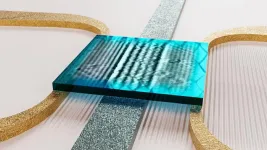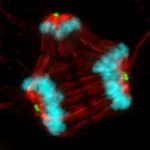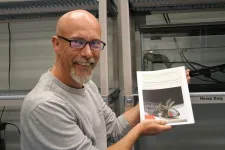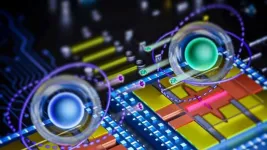(Press-News.org) Quantum physicists at Delft University of Technology have shown that it’s possible to control and manipulate spin waves on a chip using superconductors for the first time. These tiny waves in magnets may offer an alternative to electronics in the future, interesting for energy-efficient information technology or connecting pieces in a quantum computer, for example. The breakthrough, published in Science, primarily gives physicists new insight into the interaction between magnets and superconductors.
Energy-efficient substitute
"Spin waves are waves in a magnetic material that we can use to transmit information," explains Michael Borst, who led the experiment. "Because spin waves can be a promising building block for an energy-efficient replacement for electronics, scientists have been searching for an efficient way to control and manipulate spin waves for years."
Theory predicts that metal electrodes give control over spin waves, but physicists have barely seen such effects in experiments until now. "The breakthrough of our research team is that we show that we can indeed control spin waves properly if we use a superconducting electrode," says Toeno van der Sar, Associate Professor in the Department of Quantum Nanoscience.
Superconducting mirror
It works as follows: a spin wave generates a magnetic field that in turn generates a supercurrent in the superconductor. That supercurrent acts as a mirror for the spin wave: the superconducting electrode reflects the magnetic field back to the spin wave. The superconducting mirror causes spin waves to move up and down more slowly, and that makes the waves easily controllable. Borst: "When spin waves pass under the superconducting electrode, it turns out that their wavelength changes completely! And by varying the temperature of the electrode slightly, we can tune the magnitude of the change very accurately."
"We started with a thin magnetic layer of yttrium iron garnet (YIG), known as the best magnet on Earth. On top of that we laid a superconducting electrode and another electrode to induce the spin waves. By cooling to -268 degrees, we got the electrode into a superconducting state," Van der Sar says. "It was amazing to see that the spin waves got slower and slower as it got colder. That gives us a unique handle to manipulate the spin waves; we can deflect them, reflect them, make them resonate and more. But it also gives us tremendous new insights into the properties of superconductors."
Unique sensor
The researchers imaged the spin waves by measuring their magnetic field with a unique sensor, something that was essential to the experiment. Van der Sar: "We use electrons in diamond as sensors for the magnetic fields of the spin waves. Our lab is pioneering that technique. The cool thing about it is that we can look through the opaque superconductor at the spin waves underneath, just like an MRI scanner can look through the skin into someone's body."
New circuits
"Spin wave technology is still in its infancy," Borst says. "For example, to make energy-efficient computers with this technology, we first have to start building small circuits to perform calculations. Our discovery opens a door: superconducting electrodes allow countless new and energy-efficient spin-wave circuits."
"We can now design devices based on spin waves and superconductors that produce little heat and sound waves," Van der Sar adds. "Think of the spintronics version of frequency filters or resonators, components that can be found in electronic circuits of cell phones, for example. Or circuits that can serve as transistors or connectors between qubits in a quantum computer."
END
Controlling waves in magnets with superconductors for the first time
2023-10-27
ELSE PRESS RELEASES FROM THIS DATE:
$1.5 million DOD grant will create virtual reality test to assess TBI in the field
2023-10-27
One of the most common injuries sustained by military personnel in recent conflicts has been traumatic brain injury, or TBI. In response to this, and the fact that military operations are increasingly being conducted by small teams in far-flung areas, researchers in the University of Arizona College of Medicine – Tucson’s Department of Psychiatry are working on a portable virtual reality system to assess TBI in the field.
Psychiatry professor William “Scott” Killgore, PhD, and his team in the Social, ...
Antibody-drug conjugate helps patients with metastatic non-small cell lung cancer live longer, delaying disease progression
2023-10-27
Treatment with datopotamab deruxtecan (Dato-DXd), a novel Trop-2 directed antibody-drug conjugate, was found to significantly improve progression-free survival in patients with metastatic non-small cell lung cancer, an improvement that was primarily driven by patients with non-squamous tumors.
These results from the TROPION-Lung01 Phase III trial, which compared the standard of care in second-line docetaxel, a type of chemotherapy, with Dato-DXd, an antibody drug conjugate, in patients with pretreated metastatic non-small cell lung cancer, were presented at the European Society for Medical Oncology 2023 Congress by Dr. Aaron ...
UTHSC cancer researcher part of $3 million collaborative project studying obesity-related cancer
2023-10-27
A University of Tennessee Health Science Center (UTHSC) researcher is a member of a prestigious team that has just received a highly competitive Endeavor Award totaling $3 million from The Mark Foundation for Cancer Research.
Liza Makowski, PhD professor in Hematology and Oncology at the UTHSC Center for Cancer Research, is a co-principal investigator on the award, which funds collaborative projects tackling complex challenges in the prevention, diagnosis, and treatment of cancer. Entitled “Inflammatory Drivers of The Obesity-Cancer Connection”, the project is led by principal ...
Common chemotherapy drugs don't work like doctors thought, with big implications for drug discovery
2023-10-27
A new study from the University of Wisconsin–Madison suggests that chemotherapy may not be reaching its full potential, in part because researchers and doctors have long misunderstood how some of the most common cancer drugs actually ward off tumors.
For decades, researchers have believed that a class of drugs called microtubule poisons treat cancerous tumors by halting mitosis, or the division of cells. Now, a team of UW–Madison scientists has found that in patients, microtubule poisons don't actually stop cancer cells from dividing. Instead, these drugs alter ...
SynGAP Research Fund awards $100,000 for investigating the impact of SYNGAP1 missense variants using structural bioinformatics
2023-10-26
TURKU, Finland – October 27, 2023 – The SynGAP Research Fund 501(c)(3) announced a $100,000 grant to researchers Pekka Postila and Olli Pentikäinen from the Institute of Biomedicine and InFLAMES Flagship at the University of Turku. Prof. Pentikäinen’s research focuses on molecular modeling and computer-aided drug discovery. Assoc. Prof. Postila is an expert on advanced molecular dynamics simulations of complex biomolecular systems. The dual research team was formed to study the structural effects of missense variants on the SynGAP protein, whose normal functioning ...
Something to chew on: Researchers look for connections in how animals eat and digest food
2023-10-26
Oct. 26, 2023
Media contacts:
Emily Gowdey-Backus, director of media relations, Emily_GowdeyBackus@uml.edu
Nancy Cicco, assistant director of media relations, Nancy_Cicco@uml.edu
UMass Lowell’s Nicolai Konow wants to bridge the gap between research on food processing and nutrient absorption.
“There is a divide between biomechanists, who study chewing and food transport, and physiologists, who examine what actually happens to food in the gastrointestinal tract,” said the assistant professor ...
Viral reprogramming of cells increases risk of cancers in HIV patients
2023-10-26
Viral infections are known to be a central cause of more than 10% of cancers worldwide. University of California researchers may have uncovered one of the key reasons why. Their findings were published today in PLOS Pathogens, a journal that reports groundbreaking work to advance understanding of how pathogens impact diseases such as cancer.
UC Davis Comprehensive Cancer Center researcher Yoshihiro Izumiya teamed up with Michiko Shimoda, who previously worked in the Izumiya Lab at UC Davis. Currently, she is a member of the Core Immunology Lab at UC San Francisco. Together, they led UC Davis researchers in the study of Kaposi’s sarcoma-associated herpesvirus (KSHV). The ...
Robot stand-in mimics movements in VR
2023-10-26
Media Note: Pictures of VRoxy can be viewed and downloaded here: https://cornell.box.com/v/VRoxyrobotproxy
ITHACA, N.Y. – Researchers from Cornell and Brown University have developed a souped-up telepresence robot that responds automatically and in real-time to a remote user’s movements and gestures made in virtual reality.
The robotic system, called VRoxy, allows a remote user in a small space, like an office, to collaborate via VR with teammates in a much larger space. VRoxy represents the latest in remote, robotic embodiment.
Donning a VR headset, a user has access to two view modes: Live mode shows an immersive image of the ...
Major milestone achieved in new quantum computing architecture
2023-10-26
Coherence stands as a pillar of effective communication, whether it is in writing, speaking or information processing. This principle extends to quantum bits, or qubits, the building blocks of quantum computing. A quantum computer could one day tackle previously insurmountable challenges in climate prediction, material design, drug discovery and more.
A team led by the U.S. Department of Energy’s (DOE) Argonne National Laboratory has achieved a major milestone toward future quantum computing. They have extended the coherence time for their novel type of qubit to an impressive 0.1 milliseconds — nearly a thousand times better than the previous record.
“Rather ...
"Recognition of human right to the environment can galvanize action and collaboration towards realization of sustainable development goals," eminent environmental lawyer says
2023-10-26
Amsterdam, October 26, 2023 – "The Human Right to the Environment affirms the right to life itself. When humans protect nature, they are also securing human health and wellbeing." An article by eminent environmental lawyer Prof. Nicholas A. Robinson sees the recognition of the Human Right to the Environment (HRE) as a first step in a long process of restoring a healthy environment for people and the planet.
Professor Robinson’s article is published in a special issue of the Journal of Environmental Policy and Law on The Human Right to Sustainable Environment. In the preface Editor-in-Chief Bharat H. Desai, PhD, Jawaharlal Nehru University, Centre ...




